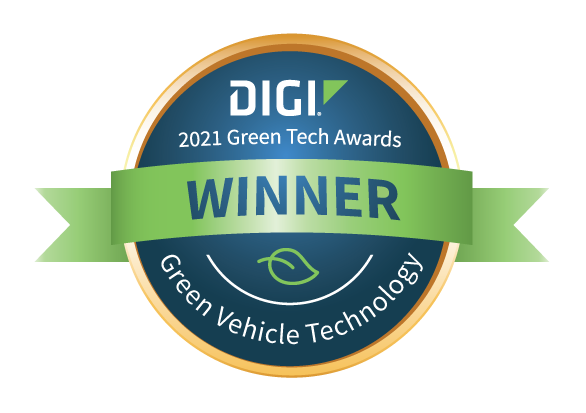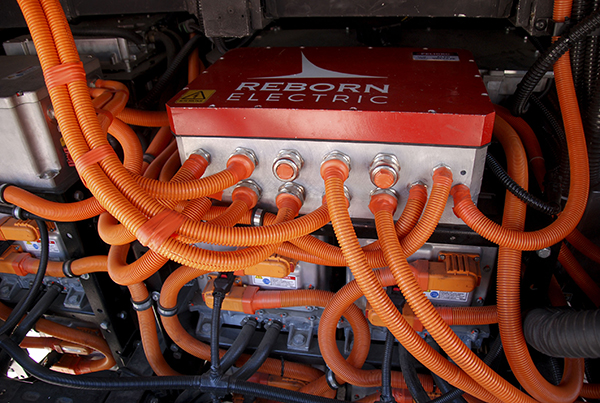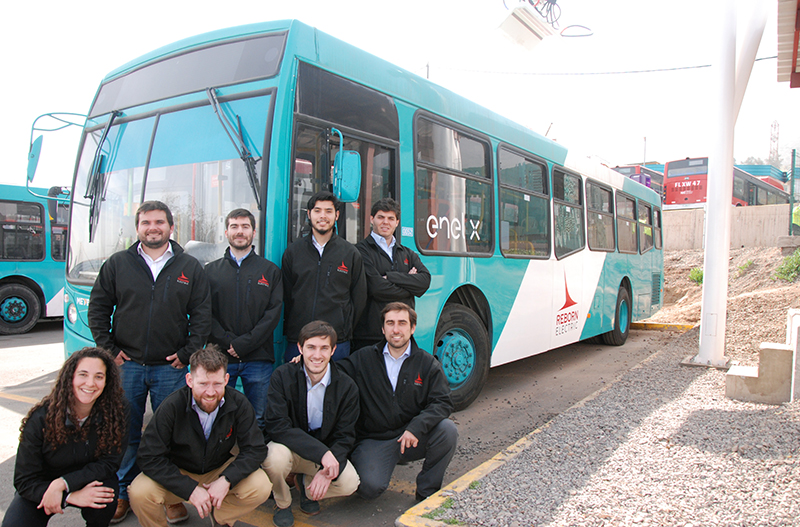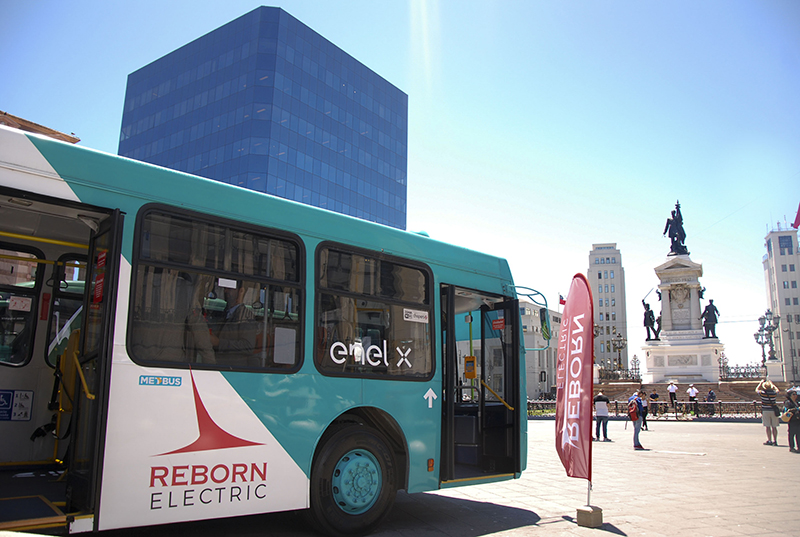
Reborn Electric converts diesel-engine buses to electric power in Santiago, Chile. Converting to zero-emission electric power greatly extends the service life of these vehicles and helps reduce air pollution in the city. To provide an interface and the telemetry needed to monitor vehicle routes and performance, Reborn chose the Digi ConnectCore 6® single board computer (SBC), helping their customers gain the maximum value for their investment in these “reborn” vehicles.
Cleaner air for a city of seven million
When most of us think about recycling, we picture a bin full of aluminum cans. A team of engineers in Santiago, Chile, however, had something more ambitious in mind. They examined the transportation needs of their city and then launched Reborn Electric, a company that takes diesel-engine buses that have reached the end of their service life and retrofits them with battery-powered electric motors.
 “Our main goal was to lower the price of public transportation,” said Nicolás Domínguez, an Electrical Engineer with Reborn. “Extending the life of these old buses substantially reduces costs for the operators.” The environmental benefits are impressive as well. Recycling in this way cuts solid waste by saving vehicles from becoming scrap metal and creating waste. And switching from diesel to electric power cuts air pollution in this beautiful, but smog-plagued city of seven million.
“Our main goal was to lower the price of public transportation,” said Nicolás Domínguez, an Electrical Engineer with Reborn. “Extending the life of these old buses substantially reduces costs for the operators.” The environmental benefits are impressive as well. Recycling in this way cuts solid waste by saving vehicles from becoming scrap metal and creating waste. And switching from diesel to electric power cuts air pollution in this beautiful, but smog-plagued city of seven million.
Seeking a Smarter SBC
Reborn starts out with buses whose diesel engines no longer comply with Chile’s increasingly strict emissions standards. But the rest of the vehicle still has many years of life left in it. The Reborn team realized it would be possible to retrofit these buses for electric power.  “The first bus that we retrofitted used to be the oldest bus in the system,” explained Domínguez. “The company that we work with picked that bus specifically because it was the oldest one in their fleet. They wanted to prove to the government that even the oldest bus could have a new life. It could be reborn.”
“The first bus that we retrofitted used to be the oldest bus in the system,” explained Domínguez. “The company that we work with picked that bus specifically because it was the oldest one in their fleet. They wanted to prove to the government that even the oldest bus could have a new life. It could be reborn.”
After gaining the support of Enel, Chile’s largest electrical utility, the Reborn engineers began the design and development process. Along with installing electric motors and a battery system, the retrofit process included modernizing the vehicles’ onboard electronics. “Once we were loading up different systems, we needed to decide whether to maintain the older interface or make something new,” recalled Domínguez. “That’s when we started the search for an SBC with CAN—and we found Digi.”
An SBC with CAN That Speaks Android
What they found was the Digi ConnectCore 6® single board computer (SBC) with its controller area network (CAN) internal connections. “We saw the specs of the Digi ConnectCore 6 SBC and decided to give it a try. And it has worked wonderfully,” said Domínguez. “Because the Digi device was already CAN integrated, we condensed all of the embedded engineering into Digi. That freed up a lot of time.”

The Reborn team discovered that another advantage of the Digi ConnectCore 6 SBC was its Android and Linux-based design, which made it easy to use in the development process. “It’s very easy to develop an application in Android or Linux rather than in specialized software,” said René Rosati, the Lead Electrical Engineer on Reborn’s R&D team. “We also used the software libraries that Digi offers to accelerate development. We took the CAN sample and modified it to develop our first prototype. That was a huge time saver,” Rosati added. “It also supports displays. So we don’t need to make special PCBs to have an interface. That’s been quite useful for us.”
Digi Telemetry Saves the Cost of a Separate Device
In addition to the interface, Reborn wanted to add telemetry to monitor vehicle routes, power consumption and to gather data for predictive maintenance. “We considered buying a separate device for telemetry, but then we found that the Digi ConnectCore 6 could serve both purposes—interfacing and telemetry,” said Domínguez.
The telemetry functions depend on the connectivity environment where the bus is operating. For buses running in the streets of Santiago, where there is a good signal everywhere, data can be gathered and uploaded continuously to the cloud. But Reborn is also working on a project with a company servicing the world's biggest underground mine, El Teniente, where there is no cellular connectivity whatsoever. “So, data is stored in a database within the Digi controller and then uploaded at the end of the day when the bus returns to the depot,” said Dominguez.
A Young Company Looks to the Future
While Reborn Electric is still a young company, they’ve started thinking about future expansion into other countries in Latin America, including Ecuador, Peru and Argentina. “Our solution is well suited to transport systems in this part of the world,” explained Domínguez, “because budgets are always tight and it’s much cheaper to recycle buses than to buy new ones.”
“Our solution is well suited to transport systems in this part of the world,” explained Domínguez, “because budgets are always tight and it’s much cheaper to recycle buses than to buy new ones.”
In fact, Chile is already one of the world’s biggest markets for electric buses. As cars, trucks and buses worldwide shift over to electric power, Reborn Electric plans to be an important participant in that transportation revolution. And Digi plans to be right there with them for the journey.